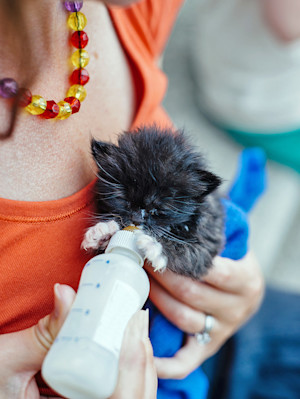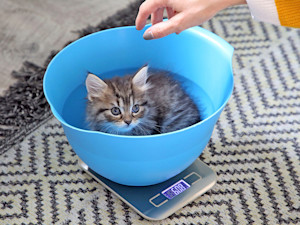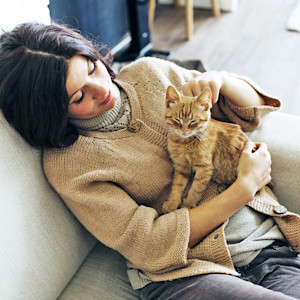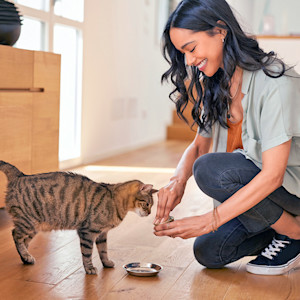Kitten Constipation: What to Do When Your Kitten Can’t Poop
It’s more common than you’d think. Here’s how you can help your kitty.
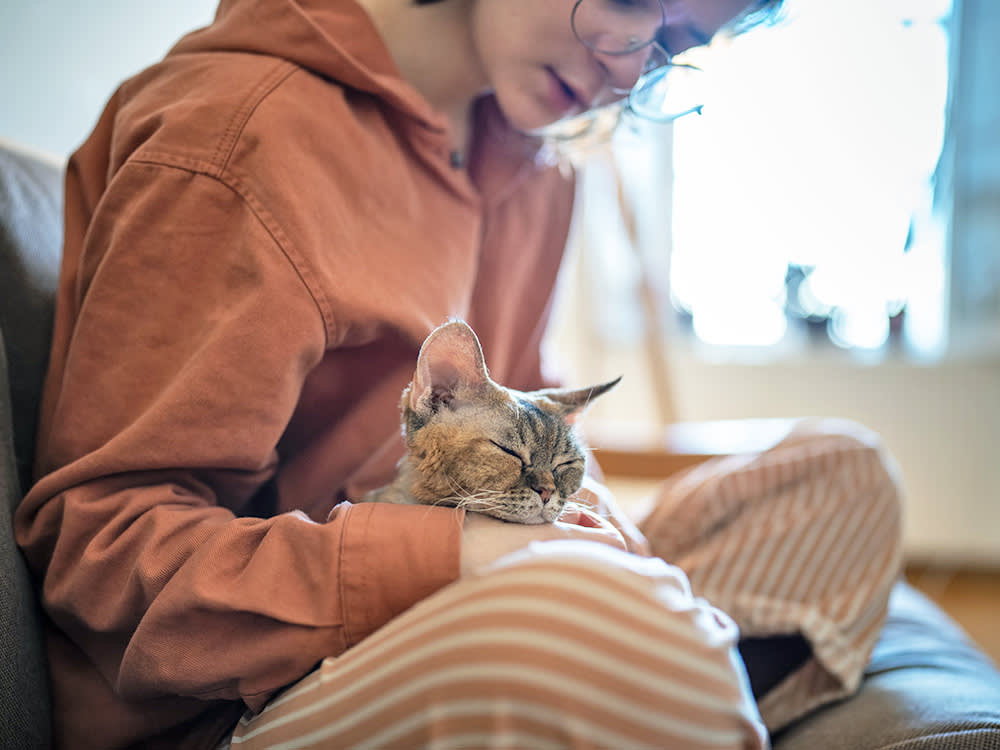
Share Article
In This Article:
What Is Kitten Constipation?opens in a new tab Symptoms of Kitten Constipationopens in a new tab Causes of Kitten Constipationopens in a new tab How Veterinarians Diagnose Kitten Constipationopens in a new tab Treatments for Kitten Constipationopens in a new tab Prevention of Kitten Constipationopens in a new tab
Bringing home a new kitten is a delightful experience that puts big smiles on everyone’s faces. Watching a kitten play, whether they’re only a few weeks old or six months old, can bring hours of joy. That’s why there are so many videos of cats on the internet — their antics can be quite funny.
However, if your kitten becomes constipated — which can happen to any kitty — their playfulness can gradually turn to expressing discomfort or pain. And that’s a reality check to be taken seriously. If you don’t know exactly how to recognize kitten constipation or what to do about it, you will by the end of this guide.

littleKin™ is Kinship’s home just for puppy and kitten parents. Bop over to check out expert advice, new pet tools, and special deals—all curated for your newest family member.
opens in a new tabWhat is kitten constipation?
Constipation in kittens means the same thing it does in humans. When the food your kitten eats travels through the intestines to the colon, but the stool can’t be passed, that is called constipation. Unfortunately, not only is it uncomfortable, but if it’s not relieved right away, it can be dangerous for your cat. It’s important as a cat parent that you learn about constipation, its symptoms, causes, and treatment.
Symptoms of kitten constipation
Recognizing symptomsopens in a new tab of a condition early is always better, even for constipation. The earlier it’s identified, the sooner treatment can begin, resulting in a better outcome.
Common symptoms of kitten constipation include:
Small, dry, and hard feces in the litter box
The sound of your kitten crying and straining while trying to pass stool
Multiple trips to the litter box without producing anything except urine
A swollen belly that hurts when you gently press on it
A decreased appetite or no appetite at all
Lethargy
A kitten or cat who has these symptoms needs help. If they’re a tiny kitten, it’s an emergency.
Causes of kitten constipation
There are multiple causes of constipation in kittens. Knowing these can help you prevent future episodes of constipation.
Dehydration
If a kitten is not consuming enough water, they will produce hard, dry stools. They can become hard to pass. One of the most common times this can happen is following the transition from mother’s milk or formula to regular kitten food. Many people feed their cats dry food, which has very little moisture in it. This can lead to dehydration and constipation. To avoid this, add water to the dry food or feed them canned food.
Gastrointestinal obstruction
Cats, being self-groomers, can ingest hair, leading to constipation. They also like to chew on toys, especially when they’re young, and can swallow a piece of one. Blockages may result, and can be very painful and require immediate veterinary attention. Surgery may be necessary to remove the obstruction.
Parasites
Kittens often come with parasites when you adopt them. Usually, constipation is due to intestinal worms. There are several types, such as roundworms, hookworms, and whipworms. If there’s an overabundance, the worms can interfere with digestive processes or even cause constipation or an obstruction. In these cases, dewormers prescribed by your veterinarian must be administered.
Age
Young kittens who are orphaned need stimulation by a pet parent mimicking what a mother cat would do to instigate poopingopens in a new tab by stimulating their anal regions. They will become constipated if they aren’t properly stimulated, or if it’s not done right. Kittens are not able to defecate on their own until four weeks of age or sometimes longer.
Other diseases
Some congenital diseases (conditions your kitten is born with) can contribute to constipation. Cats can have megacolon (or, enlarged colon), neurological disorders, or dietary intolerances that lead to constipation. Your vet must identify these conditions and decide how to manage them best.
How veterinarians diagnose kitten constipation
A visit to the vet begins with a thorough history, which can give the doctor clues. The vet will then conduct a comprehensive examination.
The vet will gently palpate the kitten’s belly to feel for stool buildup and to see if the palpation causes a pain reaction. The vet will also carefully check the kitten’s hydration status. An X-ray or ultrasound may be needed to verify stool buildup and look for blockages or abnormalities. A fecal exam will be performed to look for parasites. These steps assist the veterinarian in developing a specific treatment plan for your kitten.
Treatments for kitten constipation
Treatment will be recommended depending on the results of the vet’s exam and any tests taken. If no underlying cause for the constipation was found — and the stool buildup was not severe — your kitten may be sent home with a mild laxative.
If their condition is more severe, an enema may be necessary. If any parasites are found, a dewormer will be given. If your kitten is dehydrated, fluids may be given either subcutaneously (under the skin) or through an IV. If any obstructions or abnormalities are found, your vet will discuss options with you: There may be further testing or a recommendation for surgery.
The severity and underlying cause of constipation determine the treatment options. Home remedies and medical interventions may be necessary to resolve the issue.
Home remedies
For mild cases of constipation, you can try the following remedies at home.
Offer fresh water, refilling the bowl frequently.
Add water to dry food (which has very little moisture in it), or feed them a canned food diet. You may even add water to the canned food.
A pet fountain is an excellent addition. Cats often prefer moving water and will drink more if it’s from a fountain.
Add a small amount of pure pumpkin puree (which doesn’t have any added sugar or spices) to their food to increase fiber intake.
If your kitten is very young, your vet can teach you to gently stimulate their anus with a warm, damp, soft cloth to encourage defecation. This should be done after every feeding.
Try to get your kitten to play more and move around in any way possible to stimulate the intestines.
A small drop of coconut or olive oil (ask your vet for the proper dosage) can help lubricate the intestinal tract and make stool passage easier.
Ask your vet if it is OK to give your kitten a probiotic. Probiotics can improve intestinal health and support digestion. They may be especially helpful if your kitten has recently experienced stress or a dietary change.
If these home treatments do not alleviate constipation, your kitten should see the vet for possible medical treatment.
Medical treatments
For more severe cases, a veterinarian is needed. They will play a critical role in relieving your kitten’s constipation and finding the underlying cause. Some of the aids they will use include the following.
Medications such as a laxative (lactulose) or stool softener (polyethylene glycol) will encourage easier bowel movements. These medications have to be administered carefully to avoid overcorrection, causing diarrhea.
Your vet may also give your kitten an enema to soften their stool and make it easier to pass. Never attempt to administer an enema at home, because this requires the proper expertise and equipment to avoid injury and additional complications.
Administering subcutaneous or IV fluids can rehydrate your kitten and improve stool consistency. Proper hydration helps soften stool.
In severe cases, when nothing works, the veterinarian may have to manually evacuate the stool. Your kitten will likely be sedated to keep them comfortable.
In rare cases of severe obstruction, surgery may be necessary to remove the blockage.
The vet will look for and address the root cause of constipation, which could be due to parasites or a lack of fiber in the diet. This may involve giving deworming treatments, changing the kitten’s diet, or other long-term management strategies.
Surgery, although rare, may be needed to address GI obstructions or severe anatomical abnormalities. This is a last-resort procedure.
Always consult your veterinarian before administering any medications or treatments.
How to prevent kitten constipation
Many causes of kitten constipation can be prevented.
Ensure your kitten has fresh water available all the time.
Feed canned food instead of dry kibble.
Feed a high-quality balanced diet labeled for kittens, with the right amount of fiber.
Keep all your veterinarian appointments for vaccinations and dewormings.
Encourage exercise with toys, and set aside a time when you can play with your kitten.
Keep the litter box clean at all times. Scoop it twice daily and monitor its contents.
Following these suggestions ensures that your kitten is less likely to suffer from constipation.
FAQs
How do you make a four-day-old kitten poop?
Kittens up to four weeks of age can’t defecate or urinate independently. The mother cat stimulates them to poop by licking the anal and genital area. A four-day-old kitten needs to be stimulated by mimicking the mother’s licking. A warm, damp cloth or cotton ball can be used to gently massage the area until they urinate and defecate. Do this after every meal.
What is the triangle method for kittens’ poop?
The triangle method is similar to the method described above. Use a soft, warm cloth and create a triangular motion around the kitten’s anus and genital area. This is similar to what a mother cat does to help kittens relieve themselves.
References
White, RN. “Surgical Management of Constipation.” Journal of Feline Medicine and Surgery, vol. 4, no. 3, Sept. 2002, pp. 129–138, https://doi.org/10.1053/jfms.2002.0171opens in a new tab. Accessed 16 Apr. 2022.
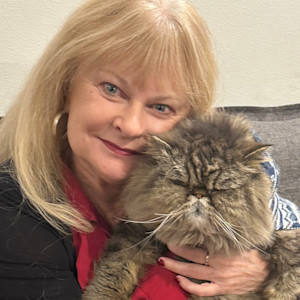
Dr. Shelby Neely, DVM
Dr. Shelby Neely is a freelance writer and veterinarian who graduated from The University of Pennsylvania and has practiced veterinary medicine for 30 years. She has found homes for hundreds of stray pets and has two cats as well as four grand-dogs and two grand-cats. In her spare time, Dr. Neely likes to be with her three children, their dogs and cats, and her own two cats. She also likes to see as many Broadway shows as possible.
Related articles
![Woman snuggling her kitten on her lap.]() opens in a new tab
opens in a new tabKitten Diarrhea: Causes, Symptoms, and Treatment
Gross? Yes. Important to discuss? Also, yes.
- opens in a new tab
Can You Overfeed a Kitten?
Guidelines from keeping them full — but not too full.
![Woman holding small kitten in her hands.]() opens in a new tab
opens in a new tabKitten Weight Chart: Track Your Kitten’s Growth
See how they should be progressing.
![Woman feeding her kitten.]() opens in a new tab
opens in a new tabWhen Can a Kitten Eat Wet Food?
And how to know what kind they need.
- opens in a new tab
How Long Can a Kitten Go Without Pooping?
Our experts explain.
- opens in a new tab
Why Does Your Kitten Eat So Much?
Usually, a hungry, hungry kitten is perfectly normal. But here’s when a kitten eating a lot is cause for concern.
